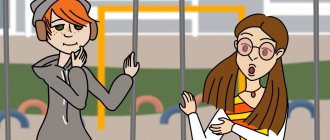American composer Ned Rorem said: “Humor is the ability to see three sides of the same coin.” Psychology completely agrees with this opinion. A developed sense of humor really helps to see a situation in a different light and find more options for solving a problem.
Humor helps prevent and resolve conflicts, build relationships, and express oneself. This is the quality that attracts men and women equally. But this is only part of the benefits. Humor can also heal our souls. In psychology there is even therapy with laughter (humor).
Sense of humor in psychology
“If you make jokes, people won't take you seriously. And these same people do not understand that there is a lot that cannot be endured without joking,” Ernest Hemingway.
By what a person laughs at and how he jokes, you can learn a lot about him, for example, his values and beliefs, principles (or lack thereof), pain points, character traits and temperament, level of intelligence and breadth of horizons, depth of inner world.
I think you yourself have noticed that it is very easy to make someone laugh, someone understands only direct jokes, someone repeats other people's examples, and someone jokes themselves, and in such an interesting and subtle way that they are not always understood by others.
What is the structure of humor and why is the sense of humor different? A sense of humor involves cognitive processes and emotions, as well as physiology.
- Cognitive processes are attention, memory, thinking, imagination and more. The higher these mental properties are developed, the sharper and more interesting a person’s sense of humor is.
- What does this have to do with the physical level? This refers to the verbal and non-verbal methods used by a person.
- About emotions, everything is even clearer: we differ by nature in temperament, and therefore in emotionality. Life experience also contributes. As a result, some are more emotional, others less. Some people have positive emotions, while others have negative emotions.
In order for us to laugh, the message (and humor is always associated with some thought, image) should not be significant for us, that is, it should introduce us into a state of play, and not cause emotions. Hence the insults with the phrases “What are you talking about, I was joking.” There are some things you can't joke about. But the trouble is that for each person these are their own ideas, personal.
From the above, another important function of humor follows: knowledge of another person and oneself. Developing your communication abilities, empathy, sensitivity, and the ability to step into another person’s shoes.
On the same basis, what we joke about, or rather what we take seriously and what not, speaks about our desires and needs, attitude towards a person or some things. Surely, something happened that you yourself did not believe in the seriousness of what was happening until the last moment.
RESPONSIBILITY
RESULTS, RESULTS RESULTS лÑÑÑ RESULTS. RESPONSIBILITY. RESULTS, RESEARCH, RESEARCH, RESULTS ››› Ñ ÑкÑÐµÐ¿Ð»ÐµÐ½Ð¸Ñ ÑоÑиалÑнÑÑ ÑвÑзей, и вÑе Ð¸Ñ Ð¿Ð¾Ð¿ ASSURANCE ASSURANCE °Ð»Ð°Ð´Ð¸ÑÑ Ð¾Ð±Ñение Ñ Ð´ÑÑгими лÑдÑми.
RESPONSIBILITY: RESPONSIBILITY, RESPONSIBILITY, RESPONSE ÑÑ Ð² данной манеÑе, ÑвлÑÑÑÑÑÑ Ð³Ð°ÑмонР¸ÑнÑми и ÑоÑиалÑнÑми лиÑноÑÑÑми, коÑоÑÑе пÑÐ › Ð ¸ дÑÑжбе. RESULTS, RESULTS ÑÑ ÑеÑнÑе Ñвзи Ñ Ð´ÑÑгими лÑдÑмР© SOS. RESPONSIBILITY, RESPONSIBILITY ASSURANCE, ASSURANCE RESULTS ÑивнÑе навÑки.
Healthy and unhealthy sense of humor
A sense of humor is a sign of a mature and healthy personality. However, there are different senses of humor and it is important to look not only at its presence, but also at its content.
- A healthy sense of humor allows you to interact productively with people and implies flexible personal boundaries.
- Unhealthy humor, as a rule, is destructive in relation to others or oneself, and interferes with the establishment of contacts. And at the same time, the immobility of personal boundaries is noted. It is often said about such people that they have no sense of humor.
Black humor is considered the most dangerous, and it is noted that it is characteristic of people with psychosis.
- For example, the humor of schizophrenics is difficult for other people to understand.
- On the contrary, paranoids do not understand the jokes of healthy people. They see insults and threats.
- The jokes of maniacs scare other people, but you can hear them very often.
The health/unhealthiness of humor can be determined using the Humor Styles Questionnaire (author: Martin). Studies were conducted using this questionnaire, during which it was revealed:
- Healthy adaptive humor is characteristic of optimists, people with adequate self-esteem and the ability to build close relationships.
- Aggressive humor is observed in dissatisfied people.
- Self-destructive and self-deprecating – in people with mental disorders accompanied by depression, anxiety and hostility, low self-esteem and dissatisfaction with relationships with other people.
Self acceptance
People with a good sense of humor are prone to self-irony and, as a result, deep introspection. Proof of this is the widespread popularity of the stand-up comedian movement. People from the stage talk about their thoughts, observations, problems and often about their so-called “pain”, which is often mentioned by members of the jury of the TV show “Open Microphone” on the TNT channel and, concurrently, by the first stand-up comedians in Russia.
It is precisely because of the ability to look “inside themselves” that people with a good sense of humor react more easily to their own failures and shortcomings.
Types of sense of humor
To determine the nature of humor, and therefore the personal characteristics of a person, it is not necessary to communicate with him, it is enough to analyze the products of his creativity (drawing, script, book, song). Which is what R. Silver did. The author used a drawing test. As a result, she identified 7 types of sense of humor:
- Pathological black humor. He is characterized by laughter at situations of death and danger. This is a mockery of other people's suffering and fears.
- Non-pathological black humor. Laughter also at the situation of death, misfortune, but on the condition that the participant in this situation does not demonstrate suffering or fear.
- Derogatory humor. Involves ridicule and humiliation for some reason.
- Self-deprecating humor. Making fun of your own unpleasant traits.
- Vague humor. Something detached, not suggesting a specific development of events further.
- Moderately positive humor. It involves overcoming failures through ridicule, good laughter at oneself. Especially in achieving success.
- Expressed positive. Added to the above is a play on words, ridiculing the absurdity and duality of the situation. This is playful humor, sometimes bringing together several characters.
Each person is characterized by the predominance of one or another sense of humor, depending on the situation. But this makes it difficult to differentiate the sense of humor according to the principle of pathology/norm.
How can you tell if you are having a panic attack?
As the name suggests, the main symptom of a panic attack is a sudden and seemingly causeless attack of anxiety and fear. It is accompanied by unpleasant sensations: palpitations, a rush of cold sweat, trembling in the legs, chest pain, difficulty breathing, and so on. Symptoms can be very different, but the main thing is that they should disappear without a trace after 5-20 minutes, along with a feeling of fear. The diagnosis of a panic attack cannot be made on the basis of symptoms alone: you need to make sure that the cause of the symptoms is not some other disease (for example, heart disease).
The panic attack itself usually does not cause any harm. The symptoms are extremely unpleasant, but go away quite quickly. The main problem is the fear that panic will happen again: for example, for a person who has had a panic attack in the subway a couple of times, going down to the subway again can be a big problem. Such fear can be “self-fulfilling”: a person experiences tension, and under the influence of stress a panic attack occurs again. In severe cases, agoraphobia can form - a condition where almost any interaction with society causes attacks of fear and discomfort, and the person is forced to spend his life locked up.
From a physiological point of view, a panic attack is an unreasonably sharp response of the nervous system to an external stimulus, which in reality is not at all dangerous. All its symptoms are part of the “fight or flight” defense mechanism that is triggered, say, when encountering a bear in the forest. In these cases, there is indeed a reason for fear, and a rapid heartbeat makes it possible to run faster. However, for a reason that is not entirely clear, this mechanism sometimes works “without a bear,” that is, for no apparent reason.
This makes panic attacks similar to vegetative-vascular dystonia, a disorder of the autonomic nervous system that is described only in the domestic literature. This diagnosis is not widely used abroad: it does not say anything about the cause of the disease, characterizing only its mechanism.
Functions of humor
Humor is a means of communication, a way of playing and flirting. In psychology, this playful state is called paratelic. What other functions does humor have?
- helps to integrate into the company;
- can be an option for psychological protection (saves from personality disorders and internal contradictions);
- acts as a way of expressing aggression or sexuality (interest);
- helps process information.
In addition, social functions include:
- social activity and the ability to go beyond social boundaries;
- removal of responsibility (if you want to say something, but are afraid, then say it as a joke);
- regulation of relationships;
- protection of social status and hierarchy;
- identity and cohesion.
The main psychotherapeutic function is that humor allows a person to look at his problems, desires, personal qualities from the outside, and then, transforming them into acceptable forms, accept them. This is important for the internal and external integration of a person.
In addition, humor allows you to positively reassess stressful situations, maintain inner freedom, overcome feelings of despair and difficult life situations - it is also a means of self-regulation.
Where is the best place to joke?
To learn how to joke, you first need to choose a familiar company. These should be understanding people who, in the event of a possible mistake, will not humiliate or ridicule. After some time, you can try your jokes in the company of people who are already experienced in humor. If you notice that you were understood and appreciated (and here a smile is enough), you managed to make them laugh, there is a reason for pride.
It is best to joke in a company that is already prepared for fun. It could be any holiday where everyone came in a good mood, for example, a birthday, New Year or any party.
How to develop a sense of humor (recommendations for every day)
First of all, it is important to understand what is necessary for a sense of humor:
- mature cognitive processes (psychophysiological adulthood);
- formed self-concept and developed self-awareness (personal maturity);
- complex internal organization (deep and wide inner world);
- very well developed abstract thinking.
All this is necessary to understand how the subject of jokes relates to the author himself and other people. Of course, everyone can laugh. But it is obvious that the reasons for laughter and the content of jokes of a child and an adult developed personality are very different.
For the formation of a sense of humor, a sense of self-irony is of great importance, which in turn is associated with self-acceptance and self-understanding. The second element is psychological safety, a sense of security and self-confidence.
Without a sense of humor, life is difficult for both the person himself and those around him. But it can be developed.
- First of all, remember what underlies it: a high level of development of cognitive abilities. Accordingly, train your intellect, memory, and thinking.
- Read books, watch movies. Firstly, books develop us, and secondly, you can find a lot of witticisms and interesting images there. The more often you encounter a pattern, the more firmly it will take root in your subconscious. Ask someone to “decipher” humor for you, and gradually you will learn to see it yourself. A little later he will be able to come up with jokes himself.
- Broaden your horizons, expand your vocabulary. Master communication techniques.
- How to joke? You take some unimportant image for you and your interlocutor and, using an analogy, compare it with something (“Well, you’re just like…”) or use logic to come up with the outcome of events (“You would also…”).
- Develop self-irony. To do this, you need to realize your shortcomings and accept them, and then learn to calmly use them.
- Memorize and tell jokes. Most likely, this method is suitable for beginner pranksters. But gradually, if you follow other recommendations, you will be able to joke yourself. Tell jokes that are relevant and artistic, conveying emotions through words and gestures.
- Don't be afraid to answer a joke with a joke. Witty people attract each other. It’s always nice to hear a worthy answer, to realize the kinship of soul and intellect.
- Learn to see something funny in everyday life: here in the crowd a lady walks in a funny hat like Shapoklyak’s, but there’s a funny sign at the beauty salon, and there’s a man there, well, a copy of a cartoon character.
- Watch performances by stand-up comedians. How gracefully they joke about the shortcomings of the world or their own shortcomings! But not all authors, some slip into vulgarity. In my opinion, stand-up comedian George Carlin is excellent in his genre.
- Always watch others' reactions to your jokes. You can directly ask someone close to you to observe you, criticize, help, or suggest.
In general, you need to develop yourself and grow personally.
If you have a panic attack: what to do?
At the moment when a panic attack occurs, there is no way to analyze the reasons. But there are several ways to help you cope with a panic attack:
Take a few breaths into any container. It could be a plastic cup or even a bag - just breathe calmly into it. This way you can quickly stabilize your breathing and cope with panic.
Shift your attention to something external. For example, count the columns in a metro station or the buttons on a passerby’s jacket - any concentration on foreign objects will help you come to your senses and feel connected to reality again
Stay where you are, or better yet, sit down. During a panic attack, try to limit your movements, if possible, sit down and “freeze,” as it were. This method, like the previous one, helps to concentrate attention on the world around you, and not on your unpleasant sensations. Talk to someone. Yes, this may seem strange at first glance, but a random passerby to whom you turn for help is able to help you simply with their attention. Communication with another person will give you a feeling of security and distract you from the attack.
Exercises to develop a sense of humor
Spend at least an hour a day on each exercise.
Ambiguity
Remember as many words as possible with double meanings. The principle of such jokes: in the first sentence we think about one meaning, and already in the second we understand that the meaning was different. That's why it's funny.
From the reverse
The easiest way. Learn to comment on things by imagining them in the opposite sense. This is how expressions a la “You are smart today” are born (when a person is clearly rumpled in front of us). The main thing is not to go to the extreme of insults and caustic humor. It is with the “reverse” technique that such a danger exists.
Associations
Look for some interesting elements in your friends and come up with associations for them on paper. You can come up with whatever you want, but if it’s better for the “guinea pig” not to know, then burn and tear up the papers.
Fantasies
Every day, choose one letter and try to come up with sentences consisting of words exclusively starting with that letter. Let it come out unrealistic, absurd. Doesn't matter! You learn to be creative, develop your thinking, imagination, and expand your vocabulary.
You can always develop a sense of humor. Yes, some people are naturally endowed with wit to a greater extent, others less so, but this is not so important. It would be more accurate to say that some people have higher natural emotionality and sensitivity, but the acuity and flexibility of the intellect, abstract-logical and creative thinking, as well as understanding people and situations are a gain. The main thing is not to be lazy and regularly improve yourself.
Mismatch theory
The presented theory has its roots in the views of Arthur Schopenhauer, who believed that the cause of laughter always lies in the sudden perception of a discrepancy between ideas about objects and their real images. This discrepancy is the most important factor determining the comedy of a joke: everything that does not meet expectations, everything that seems unusual, peculiar, amazingly absurd, seems funny.
This idea was developed by the British psychologist Hans Eysenck. He believed that the cause of laughter is the sudden intuitive integration of incompatible or contradictory ideas, feelings or attitudes objectively experienced by a person. The idea was also developed by journalist and psychologist Arthur Koestler: he introduced the term bisociation, which occurs when an event, situation or idea is perceived at the same time from two completely logical, but incomparable angles.
It is worth noting the theory of inconsistency resolution by Thomas Schultz. He believed that what allows a joke to be understood is not the incongruity, but its resolution in the joke: it is the moment of the punchline in the joke that generates cognitive incongruity through the introduction of information inconsistent with expectations. For this reason, the listener returns to the beginning of the joke and tries to identify the ambiguity that will resolve the incongruity.
There is also a two-stage theory of understanding humor proposed by psychologist Jerry Suls. In it, the main part of the joke creates an incongruity that causes the listener to assume the likely outcome. The discrepancy between the outcome and expectations causes the listener to be surprised and look for a cognitive rule to restore the cause-and-effect logic, the beginning and the outcome. After finding this rule, the inconsistency can be eliminated, the joke is perceived as funny, and humor becomes the result of eliminating the inconsistency.
The theory is certainly valid, but even this time scientific research (in particular by the German psychologist Kurt Goldstein and his colleagues) showed that incongruity, although necessary, is not the only condition for humor. We must not forget about a person’s psychological mood for humor and his emotional readiness for it. Incongruity theory comes closer to understanding humor, but not to explaining its emotional pleasantness.
Psychoanalytic theory
The author of the psychoanalytic approach to the study of the theory of humor, as one should assume, was Sigmund Freud. His theory (like the theory of psychoanalysis in general) was one of the most influential in the field of psychological research on humor in the first half of the 20th century. According to her, humor can be considered as the strongest defense mechanism for coping with difficulties and negative emotions.
In Freud's theory, laughter and humor are understood as ways of manifesting the unconscious, creating tension and a desire for release. Humor overcomes defense mechanisms thanks to the “humorous movement” from the area of the forbidden to the area of the permitted, as a result of which the power of the “Id” and “Super-Ego” decreases, and internal censorship and unconscious passions lose their power.
Based on Freud's ideas, unconscious aggressive (generated by libido) and sexual urges from childhood and immaturity seek to find instant gratification and express themselves through pleasure. The “Super-Ego,” which includes the demands and regulations of society, counteracts the “Id.” The “Ego” functions according to the principle of reality - it strives to come to a convenient compromise between the requirements of the “Id”, “Super-Ego” and the real world, which, according to the scientist, is humor.
Sigmund Freud said that humor is the highest defense mechanism because... allows you to avoid negative emotions and look at life situations objectively, without resorting to pathological defensive forms. His experiments showed that:
- People who repress aggressive or sexual impulses in everyday life find jokes that contain relevant themes more enjoyable.
- If aggressive and sexual urges are stimulated, jokes related to these urges will be more enjoyable
- Presenting aggressive and sexual jokes reduces the strength of corresponding impulses
In addition, some confirmation of Freud's theory was found in studies demonstrating an increase in sexual and aggressive themes in the responses of respondents who completed tasks to generate humor.
Subsequently, many researchers came to the conclusion that Freud’s theory does not agree with the functioning of the nervous system in the modern understanding, and began to gradually abandon it.
Lonely jokes
It’s impossible not to notice that the type of joke has changed in recent years. She transformed from a word into a picture - a meme.
Fact
A meme is any symbol or idea transmitted from person to person through gestures, speech, writing, etc. The term was coined by English evolutionary biologist Richard Dawkins in 1976 in his book The Selfish Gene.
However, this harmless “creature” also made adjustments to people’s communication.
Jokes on the Internet.
CCO.
Elena Vladimirova, family psychotherapist:
It is clear that we have moved from real life to virtual. This also affected the humor. After all, for example, jokes work in a lively conversation over tea. I usually don't want to read them.
And memes are perceived easily and quickly. They go anywhere in a split second. And even if you have no one to share with, you can scroll alone. The less often people meet, the more new ways they communicate. Memes are one of them.










